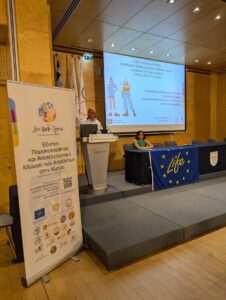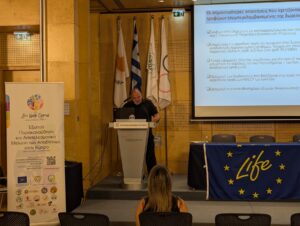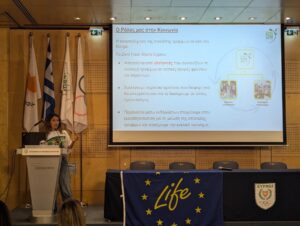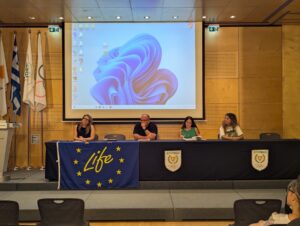The International Day of Awareness of Food Loss and Waste, celebrated globally on September 29, highlights the urgent need for collective action and collaboration. This day serves as a reminder that food waste not only burdens the environment and accelerates climate change but also exacerbates hunger and inequality. Through awareness and information initiatives, the goal is to cultivate a new mindset among all stakeholders in the food supply chain, promoting the adoption of responsible and optimal practices for reducing food waste.
In line with this effort, the LIFE IP CYzero WASTE Project organized an informative event on Friday, September 27, 2024, titled “The Contribution of Donating Surplus Edible Food to Combating Food Waste.” Representatives from the public sector, the catering industry, retail businesses, and local enterprises were invited to discuss common strategies for addressing this pressing issue.
The event began with greetings from Mr. Theodoulos Mesimeris, Director of the Department of Environment, who subsequently delivered a speech on behalf of Ms. Maria Panagiotou, Minister of Agriculture, Rural Development, and Environment. Following him, Mr. Herodotus Herodotou, Head of the Health Services Department of the Ministry of Health, offered his remarks. Both emphasized the importance of reducing food waste, highlighting the initiatives and measures implemented by their respective departments to effectively mitigate this issue.
The presentations commenced with an overview of the actions undertaken by the LIFE IP CYzero WASTE Project, which focuses on optimal management and prevention of food waste generation, thereby supporting Cyprus and other EU member states in achieving Sustainable Development Goal 12.3, as defined by the United Nations. In summary, these actions include:
- Improving organic waste management in urban, rural, and semi-rural areas through the implementation of initiatives that enhance source separation and separate collection, aimed at diverting waste from landfills (C1).
- Baseline and annual assessment of food waste and agrowaste generation in Cyprus (C4.1).
- Development and operation of a Food waste & Agrowaste Prevention Monitoring and Management Platform(C4.2).
- Foodwaste and agrowaste prevention demonstration actions (C4.3). In this context, two significant collaborations are underway: one with the Zero Waste Alliance and another with the Municipality of Nicosia. The first collaboration involves strengthening and consolidating the efforts of the Zero Waste Cyprus Initiative in collecting and distributing unsold fruits and vegetables left over after the operation of the “OXI” Market in Nicosia, aiming to increase the quantity collected and distributed, as well as replicating the initiative in other provinces of Cyprus. Additionally, this collaboration promotes initiatives to inform local businesses about the platform developed by the NGO Friends of the Earth as part of the LIFE FOODPRINT Project, alongside awareness campaigns targeting local businesses and the wider public for the adoption of good prevention practices (E1.1). The second initiative focuses on rescuing fruits and vegetables from the SOPAZ Wholesale Market, with the aim of distributing them to vulnerable social groups.
- Networking activities to exchange expertise and gather essential information for the effective implementation of action C4 of the Project (E2).
- Capacity building activities (C9).
- Development and dissemination of informative audiovisual materials (e.g., a recipe booklet from leftover recipes created in collaboration with the Cyprus Chefs Association, informational videos).
Subsequently, Mr. Philippos Georgiades, Senior Health Officer of the Health Services Department, presented the Guide to Surplus Edible Food Donation Procedures, developed in collaboration with the Department of Environment as part of the LIFE IP CYzero WASTE Project. During the presentation, key requirements related to food redistribution were highlighted, along with EU guidelines for food donation and the flexibility points identified in the application of HACCP procedures. Furthermore, guidelines for food safety management systems in retail were presented in accordance with the European Commission’s guidelines (2020/C 199/01). The goal of the guide is to encourage stakeholders to actively participate in the food donation process.
The presentations concluded with a presentation by Ms. Olivia Skordi, Project Manager of the NGO Friends of the Earth and Coordinator of the Zero Waste Alliance Cyprus Network. Ms. Skordi highlighted best practices in food waste management implemented in various countries, emphasizing government initiatives, legislation, and community involvement. She also presented the actions carried out by the Zero Food Waste Cyprus Initiative, through which unsold fruits and vegetables left after the “OXI” Market are rescued and redistributed.
Finally, there was a constructive discussion between the speakers and guests, during which specific proposals were made.






